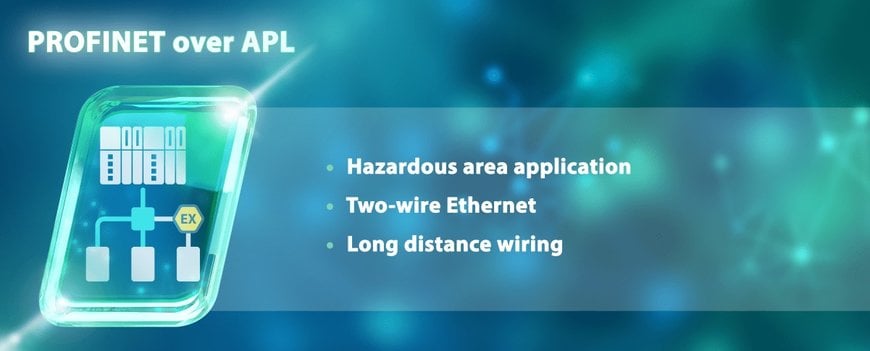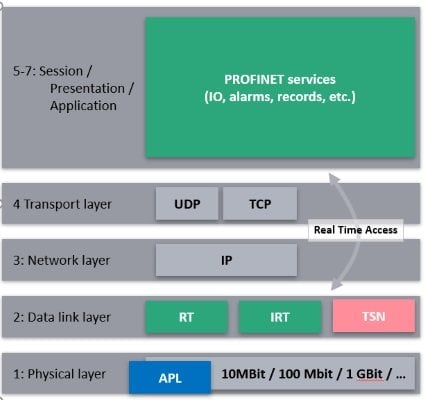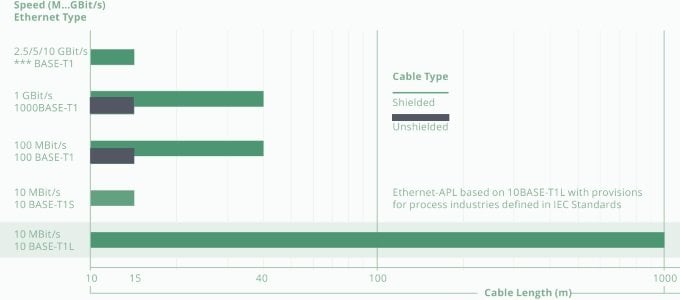Ethernet APL enables PROFINET in the Field of Process Plants
APL [Advanced Physical Layer] for Industrial Ethernet = Intrinsically Safe Ethernet.

Ethernet is the de-facto communication standard in enterprises, but it does not meet the needs of process automation without modification. Ethernet with an Advanced Physical Layer (Ethernet-APL) will enable long cable lengths and explosion protection via intrinsic safety with communication and power over two wires.
Based on IEEE and IEC standards, Ethernet-APL supports PROFINET and any other Ethernet-based automation protocol and will develop into a single, long-term stable technology for the entire process automation community.
Process plants operate for 20+ years and are required to be safe for people, the product, and the environment. Explosion potential in hazardous areas and harsh conditions requires that any deployment of new technology is both thoroughly tested and provides added business benefits. Technology must not be overly complicated or require extensive training.
The agreement to develop the Ethernet-APL technology under “The APL Project” was established in 2018 and is backed by the leading industry standard development organizations (SDOs) FieldComm Group, ODVA, OPC Foundation and PROFIBUS & PROFINET International as well as by major industry suppliers of process automation, including ABB, Emerson, Endress+Hauser, Krohne, Pepperl+Fuchs, Phoenix Contact, R. Stahl, Rockwell Automation, Samson, Siemens, Vega, and Yokogawa.
The Value added to PROFINET by Ethernet-APL
Knowing the key advantages of PROFINET and its well known broad industrial acceptance for reliable, high- performance communication in any automation domain combined with the new physical communication layer adds new capabilities for process automation such as:
- Two-wire cable
- Long cable runs
- Power and communication on the same cable
- Support of all explosion protection techniques incl. intrinsic safety
- Simple installation technology
- Reuse of existing fieldbus cable type ‘A’, which reduces cost and provides
- easy migration strategies from PROFIBUS PA to PROFINET over APL
- Resilience to electro-magnetic interference
- Support of surge protection

How PROFINET over APL differs from classic Ethernet connectivity
Ethernet-APL is an enhanced physical layer for single-pair Ethernet (SPE) based on 10BASE-T1L, as shown in the figure below.

It communicates via a cable length of up to 1000 m at 10 MBit/s, full-duplex, which is more than 300 times faster than current technologies, such as HART communication. It is the logical extension for Ethernet, that provides the attributes required for reliable operation in the field of a process plant. Ethernet-APL is a physical layer that will also support OPC-UA or any other higher-level protocol.
PROFINET over APL includes additional attributes required by process applications. These features derive from the requirements of outdoor installations and hazardous area protection. They follow respective IEC standards and provide interoperability and simplicity, for example:
- 2-WISE stands for 2-Wire Intrinsically Safe Ethernet. This IEC technical specification, IEC TS 60079-47 (2-WISE) defines intrinsic safety protection for all hazardous Zones and Divisions. For users, this includes simple steps for verification of intrinsic safety without complex calculations.
- Ethernet-APL defines port profiles for multiple power levels with and without hazardous area protection.
- PROFINET over APL allows wiring to screw-type or spring-clamp terminals, thus supporting cable entry through glands. Additionally, well-defined connector technology ensures simplicity during installation.

